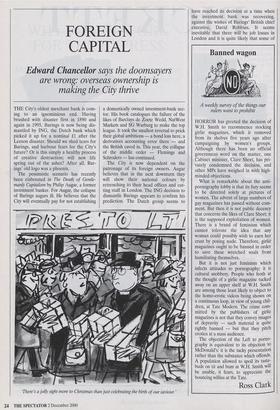Banned wagon
HORROR has greeted the decision of W.H. Smith to recommence stocking girlie magazines, which it removed from its shelves five years ago after campaigning by women's groups. Although there has been no official government word on the matter, one Cabinet minister, Clare Short, has pri- vately condemned the decision, and other MPs have weighed in with high- minded objections.
What is remarkable about the anti- pornography lobby is that its fury seems to be directed solely at pictures of women. The advent of large numbers of gay magazines has passed without com- ment. But then it is not public decency that concerns the likes of Clare Short; it is the supposed exploitation of women. There is a brand of feminism which cannot tolerate the idea that any woman could possibly wish to earn her crust by posing nude. Therefore, girlie magazines ought to be banned in order to save these wretched souls from humiliating themselves.
But it is not just feminism which infects attitudes to pornography; it is cultural snobbery. People who froth at the thought of a girlie magazine tucked away on an upper shelf at W.H. Smith are among those least likely to object to the homo-erotic videos being shown on a continuous loop, in view of young chil- dren, at Tate Modern. The crime com- mitted by the publishers of girlie magazines is not that they convey images of depravity — such material is quite rightly banned — but that they pitch erotica at a mass audience.
The objection of the Left to porno- graphy is equivalent to its objection to McDonald's: it is the tacky presentation rather than the substance which offends. A population allowed to spoil its taste- buds on tit and bum at W.H. Smith will be unable, it fears, to appreciate the bouncing willies at the Tate.
Ross Clark


















































































 Previous page
Previous page